Running an Airbnb business remotely can be a great way to earn extra money through passive income. However, managing a rental property from afar can be challenging. Do you want to know how to run an Airbnb business remotely?
In this guide, we’ll provide you with tips and tricks to help you successfully run your Airbnb rental business from anywhere in the world. We manage our property in America from Japan.
Over the past five years our Airbnb near Portland Oregon has generated hundreds of thousands of dollars. We help train new hosts to create a profitable sustainable Airbnb rental.
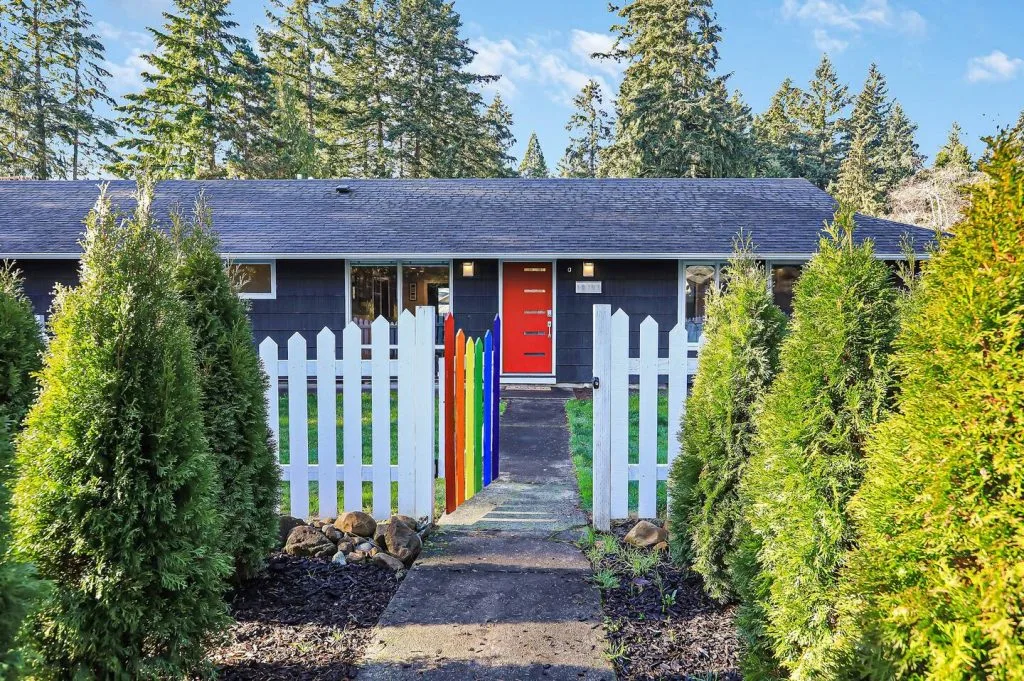
Embracing the Future of Remote Airbnb Management
Investment property ownership no longer requires hands on hot tub maintenance from the owner.
Because a vacation rental property collects higher rates than traditional long-term rental, hiring help becomes a reasonable business expense.
The Remote Work Revolution and the Sharing Economy
The world has rapidly embraced remote work, transforming the way we live and conduct business.
As digital nomads and remote workers become more prevalent, so does the demand for short-term accommodation. Airbnb guests aren’t just going to popular tourist destinations anymore.
Airbnb is the leading platform in the sharing economy that has revolutionized the travel and hospitality industry. With a growing number of people looking to invest in and manage Airbnb properties, understanding how to run an Airbnb business remotely is more important than ever.
The Power of Efficient Remote Management
An efficiently managed Airbnb business can yield significant profits, even when operated from a distance.
By harnessing the power of technology, adopting smart strategies, and maintaining exceptional communication with guests, you can create a thriving Airbnb business without being tied down to a specific location.
Remote Airbnb Success
Potential guests don’t expect to meet the property manager in person. Understanding current trends gives you a distinct advantage in the rental market to create a memorable positive Airbnb experience.
From collecting positive reviews to avoiding Airbnb horror stories, this article will show you exactly how to run an airbnb business remotely.
Crafting a Profitable and Sustainable Airbnb Business
The big difference between traditional rental property and short-term property rental is profit margins. An Airbnb property has more risk and steps involved but, it produces higher rental income.
Historically the power of an investment property was really in the property appreciation. You wanted the long-term tenants to pay off your mortgage and fund the entire house maintenance.
These days, Airbnb owners can leverage higher prices for short-term accommodations. Volatility in rental income can seem scary, but the financial upside is worth it.
Getting Started With Your Airbnb Business
Any online guru telling you to go out and start an Airbnb side hustle is doing a disservice to the sharing economy. There is a right way and a wrong way to start your Airbnb hosting journey.
Reading this guide will get you off to a great start on how to run an Airbnb business remotely.

Market Research and Choosing a Profitable Location
Before diving headfirst into the world of Airbnb, it’s a good idea to conduct thorough market research to find the best locations for your Airbnb investment.
Decide who your ideal client is. Will you cater to business travelers, sports teams, digital nomads, nomadic families, or traveling nurses?
Analyze factors like tourist attractions, seasonal trends, local events, and competition in various areas. Consider properties near transportation hubs, business centers, or popular attractions to ensure a steady stream of guests.
Remember, location is key in the short-term rental market, so choose wisely to optimize your occupancy rates and revenue.
Selecting the Perfect Property Type
When it comes to Airbnb units, there’s no one-size-fits-all solution. From cozy apartments in big cities to luxurious villas at the beach or unique spaces like treehouses and yurts, the possibilities are endless.
Keep your target audience in mind and remember their preferences when deciding on the type of property you want to invest in. Align your property selection with your target market to create an unforgettable experience that keeps your guests coming back.

This article is just the tip of the iceberg for launching a profitable Airbnb business. Get walkthroughs and expert tips from someone who’s been in your shoes.
Setting Up Your Airbnb Account and Crafting a Winning Airbnb Listing
Once you’ve chosen the ideal location and property type, the first step is to set up your Airbnb account and create an eye-catching listing.
Use high-quality photos from a professional photographer that showcase your property’s best features. Write a captivating and informative description, and highlight unique amenities that set you apart from the competition.
Make sure to include relevant keywords in your listing title and description to improve your search ranking and visibility on the Airbnb platform. Finally, ensure your profile is complete and professional, as it plays a vital role in building trust with potential guests.
Build a Strong Online Presence
In order to successfully run an Airbnb business remotely, it’s important to have a strong online presence. The good news is that short-term rental platforms do some of the marketing for you.
However, setting up your social media profiles for your Airbnb rental ensures you have more connection with your future Airbnb guests. The most popular social platforms for Airbnb hosts are Instagram, Facebook, TikTok, and YouTube.
Use high-quality photos and detailed descriptions to showcase your property, and engage with potential guests by responding to comments and messages. Showcase your living space, outdoor areas, bedrooms, and local community features.
You should also consider creating a website for your Airbnb business. This can help you stand out from competitors and provide guests with a unique experience.

Remote Property Management: Streamlining Operations From Afar
If your Airbnb unit is in San Francisco but you’re living in New York, I’ve got news for you, your next guest still needs toilet paper.
Local Co-host vs. Property Management Company
One of the most important steps to successfully running an Airbnb business remotely is to hire a local co-host or property manager. When running your Airbnb business remotely, having reliable on-the-ground support is crucial.
You can either hire a local co-host or partner with a property management company. Weigh the pros and cons of each option, such as the level of control, cost, and quality of service.
This person can handle tasks such as check-ins, cleaning, and maintenance, allowing you to focus on managing the business from afar.
To find and vet potential candidates, leverage online resources, reviews, and referrals from other hosts. Establish clear communication and expectations up front to ensure a smooth working relationship.
Remember, a trusted and experienced partner can make all the difference in managing your property efficiently. Consider offering incentives such as bonuses or profit-sharing to incentivize your co-host or manager to go above and beyond in their duties.
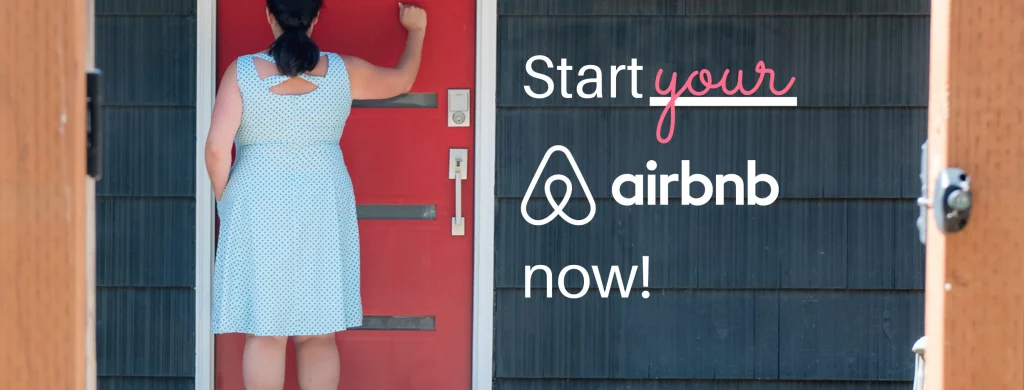
Keyless Entry Systems for Seamless Check-ins and Check-outs
One of the biggest challenges of remote property management is ensuring smooth check-ins and check-outs for guests. With smart locks, you can remotely grant access to guests and monitor when they enter and leave the property.
Implement a keyless entry system, to provide secure and hassle-free access to your property. We love our Schlage Sense Keyless Entry.
These systems not only simplify the process but also allow you to monitor and control access remotely. Additionally, they eliminate the need for physical key exchanges, reducing the risk of lost keys and unauthorized entry.
Maintaining a Clean and Well-maintained Property
A clean and well-maintained property is the easiest way to ensure great reviews. Your cleaning staff is the backbone of your Airbnb business.
From the very first guest your housekeeper will have eyes on the entire home more often than anyone else. Coordinate with them to ensure your property is spotless and maintained between guest stays.
Airbnb income should be managed carefully to proactively address any wear and tear or potential issues, like plumbing or electrical problems. By staying on top of things, you can prevent costly repairs and keep your property in top condition for your guests.
Homeowner Hustle Online Course
Everything from copy and paste house rules to instruction sign templates will be provided when you take the course. Get all Airbnb resources handed to you on a silver platter as a Homeowner Hustle student.

Setting Clear House Rules
To minimize potential issues and ensure a comfortable stay for your guests, provide clear and concise house rules and instructions.
For liability, your house rules should be lengthy. Include guidelines on noise levels, smoking, pets, and guest etiquette.
But, pick your top 3 most important house rules and put those at the top in mega bold. Short-term guests don’t spend much time reading rule books during their stay.
Provide Instructions for Everything
Originally we turned our primary residence into an airbnb-generated income. So it didn’t occur to me that guests wouldn’t know how to operate our dishwasher, touch faucet, or coffee maker.
It didn’t take long for guests to start blowing up my phone with questions. You will loose out on good reviews if your guests feel confused and stressed during their stay.
Offer detailed instructions for using appliances, Wi-Fi access, and other amenities in your property.
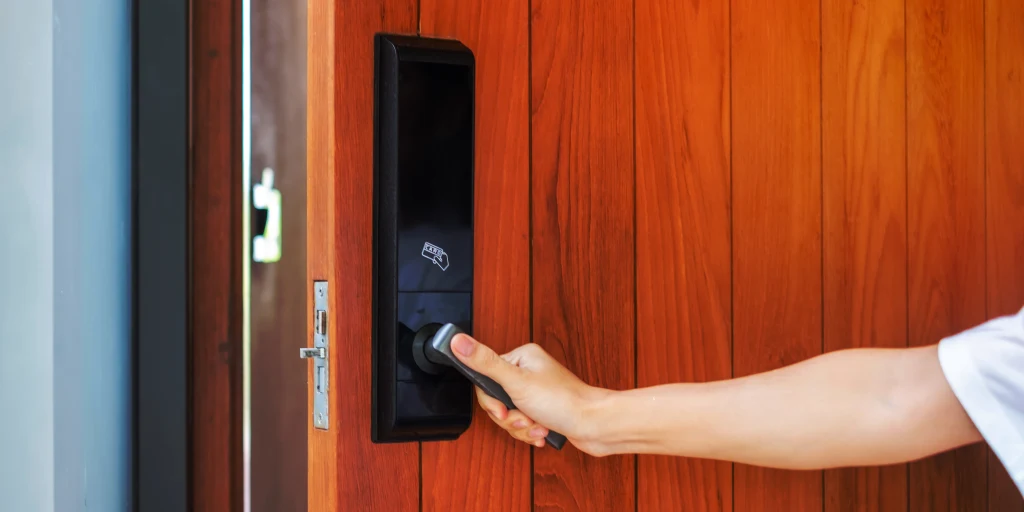
Smart Technology Solutions for Remote Management
Smart home technology can be a game-changer for running an Airbnb business remotely. This is not the area to try and save a few coin by going old school.
By investing in smart home technology, you can provide a seamless and convenient experience for your guests while also managing your property remotely.
You will reduce headaches for yourself and your staff by having the right systems in place up front.
Security Systems: Cameras
In the era of remote management, smart security solutions are your best friend.
We did not install our Arlo cameras to monitor guests like some Airbnb hosts. Instead we equipped our property with security cameras, to protect our guests from our crazy neighbors.
When installing cameras, be mindful of privacy concerns by placing them in common areas or outside the property. You will have peace of mind that security cameras deter thieves and document activity while you monitor your property remotely.
Energy Management: Smart Thermostats, Lighting, and Appliances
Energy-efficient smart technology is ideal for remote Airbnb management. Implement smart thermostats, lighting systems, and appliances to reduce energy consumption and utility costs.
Resist the urge to tip too far into the smart home technology. There is a fine line for your diverse guests between helpful and annoyingly complicated.
From a sustainability perspective, these smart technologies are critical to reducing the carbon footprint of your rental home.
Remote Property Control with Smartphone Apps
Stay connected or give your property manager access to your Airbnb property at all times with the help of smartphone apps.
Many smart devices and systems come with corresponding apps that allow you to monitor and control your property from anywhere in the world. From adjusting the thermostat to managing access with smart locks, these apps put the power of remote management right in the palm of your hand.
By leveraging technology, you can ensure your real estate investment property runs smoothly and efficiently, even when you’re miles away.
Pricing and Revenue Maximization: Boosting Your Bottom Line
When you launch a remote Airbnb it might feel more like a side hustle than a business. Your extra income from this large investment is entirely based on staying occupied.
Dynamic Pricing and Revenue Management Strategies
To maximize your Airbnb revenue, adopt a dynamic pricing strategy that takes into account factors like seasonal demand, local events, and competition.
Instead of setting a fixed rate, adjust your prices based on market fluctuations and booking patterns.
This approach helps you capitalize on periods of high demand while attracting guests during slower times, ultimately leading to increased occupancy rates and higher profits.
Utilizing Pricing Tools and Software for Optimal Rates
Leverage pricing tools and software specifically designed for short-term rentals to optimize your rates and stay ahead of the competition.
Platforms like Beyond Pricing, Wheelhouse, and PriceLabs analyze local market data and provide you with recommended pricing adjustments. By automating the process, you can save time and ensure your property is priced competitively, attracting more bookings and maximizing your revenue.

Offering Value-Added Services to Increase Revenue
It’s short sighted to assume your only income needs to come from rental revenue. You can enhance your guests’ experience and boost your bottom line by offering value-added services.
Think airport transfers, guided tours, in-house catering, childcare, or rental equipment like bicycles or beach gear. Not only do these services make your property more attractive to potential guests, but they also provide an additional stream of income that can significantly impact your overall revenue.
By going the extra mile, you can create memorable experiences that keep guests coming back and recommending your property to others.
Effective Communication With Guests: Building Trust and Loyalty
Unfortunately for you there have been enough Airbnb horror stories to write an entire series of books. This means that when guests interact with you they are on edge that you are going to be one of those nightmare property owners.
Do not let their skepticism or tone deter you from providing an incredible short term rental experience. It takes thousands of good hosts to make up for the one bad one that made the news.
Automated Messaging and Templates for Common Queries
Running an Airbnb business remotely can be challenging, but automation can help make it easier.
Streamline your communication with guests by setting up automated messaging and templates for common queries. When the initial message gives off an whiff of scammy vibes, your pre-written message will save you from wasting any time on fake clients.
Platforms like Smartbnb, Your Porter, and Host Tools can help you send pre-scheduled messages, such as booking confirmations, check-in instructions, and post-stay follow-ups. You can also automate tasks such as cleaning and maintenance by hiring a reliable cleaning service or handyman to handle these tasks on a regular schedule.
By automating routine communications and tasks, you can save time, ensure consistency, and maintain a professional image, all while providing your guests with the information they need. Even more important, you can free up your time to focus on growing your business and creating more Airbnb income.

Need expert guidance to get your journey started? I’ve got you covered. Your girl will walk you through step by step until your Airbnb is fully launched.
Providing Exceptional Customer Service Remotely
Excellent customer service is the cornerstone of a successful Airbnb business. For these last several years living outside the United States, I’ve gained new appreciation on the struggles of adapting to new homes.
If your property manager is their point of contact then don’t micromanage the relationship they create with your guests. Trust your property manager to handle what you hired them to take care of. Don’t interject or read through their communication.
Even if you’re managing your property remotely, prioritize timely and attentive communication with your guests. Be transparent about your time zone so they aren’t surprised by delayed communication. Address their questions and concerns as promptly as you can. Be proactive in offering assistance or recommendations.
By going above and beyond in your communication, you can create a positive impression, foster trust, and increase the likelihood of repeat bookings and referrals.
Encouraging Positive Reviews and Addressing Negative Feedback
Reviews play a crucial role in the success of your Airbnb business, as they can heavily influence potential guests’ decisions.
Encourage your guests to leave reviews by sending a friendly post-stay message, thanking them for their stay, and requesting their feedback.
When responding to reviews, maintain a professional and courteous tone. For positive reviews, express gratitude and invite the guest to return. For negative feedback, address the issue, apologize, and offer a resolution.
By demonstrating that you value your guests’ opinions and are committed to improving, you can build a strong reputation and attract more bookings.
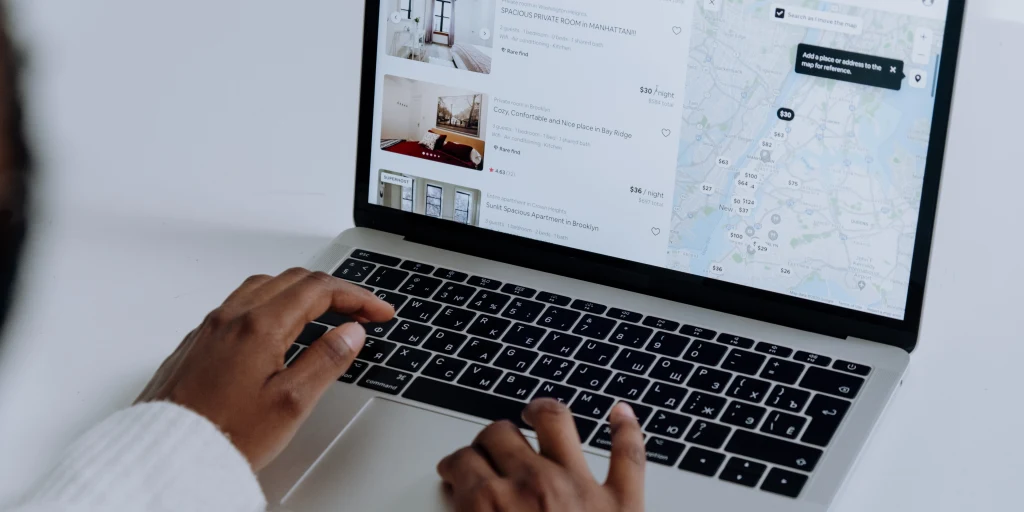
Legal and Tax Compliance: Navigating the Rules and Regulations
You might be thinking that running an Airbnb business is a bit more complicated than you originally thought. Remember, that’s a good thing. We don’t want everybody running an Airbnb.
Following local regulations are just another hurdle as you learn how to run an airbnb business remotely. Jurisdictions love their red tape and pointless paperwork.
Local Regulations, Permits, and Licenses
As an Airbnb host, it’s essential to comply with every local law, permit requirement, and business license mandate governing short-term rentals. Jurisdictions with regulations already in place are ideal, because locations with no rules could still ban Airbnb.
Short-term rental regulations can vary by city, country, state, or region, so research and familiarize yourself with the specific requirements in your property’s location. Local laws can be a web of insanity dictating parking, electrical panel location, guest identification requirements, among other things.
Some areas may impose restrictions on the number of days a property can be rented or require hosts to register with the local authorities. New legislation is constantly being implemented so set up a google alert for news on short term rental regulations in your real estate market.
By staying informed and compliant, you can avoid fines, penalties, and potential legal issues.
Ensuring Proper Insurance Coverage
Protect your investment and ensure the safety of your guests by obtaining the appropriate insurance coverage for your Airbnb property.
While Airbnb offers its Host Protection Insurance, it may not cover all potential liabilities. Consult with an insurance agent to evaluate your coverage needs, including property damage, liability, and loss of income.
By having the right insurance in place, you can mitigate risks and safeguard your business.
Understanding and Managing Taxes for Your Airbnb Business
Running an Airbnb business comes with its fair share of tax implications. Be aware of the various taxes you may be required to pay, such as income tax, occupancy tax, sales tax, or value-added tax (VAT).
Additionally, you may be subject to pay taxes on your income to whatever jurisdiction you are residing in. Yes, that’s a thing. Just because your property is in the United States doesn’t mean you won’t owe taxes to Thailand or Brazil.
Keep accurate records of your income and expenses, and consult with a tax professional to ensure you’re taking advantage of all available deductions and tax-saving strategies. By staying organized and informed, you can navigate the tax landscape with confidence and avoid any unpleasant surprises.
Scaling Your Airbnb Business: Expanding Your Empire From Afar
Now that you know how to run an Airbnb business remotely, your head is probably spinning. The ideas are swirling around in your head for the best ways to create extra cash flow.
As you consider adding a second home to your Airbnb empire take a pause to save yourself from making a large financial misstep.
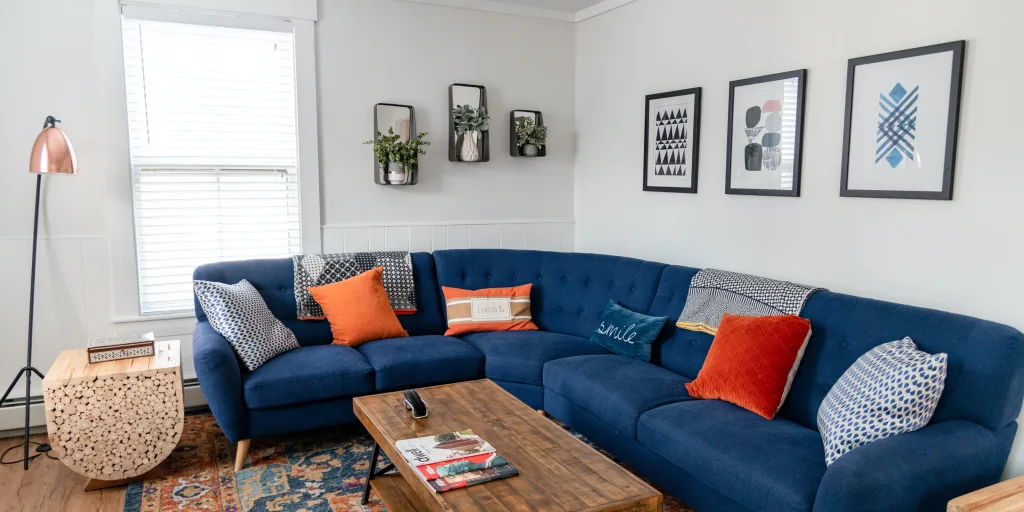
Identifying Opportunities for Growth and Expansion
As your remote Airbnb business thrives, you may want to consider expanding your portfolio. Keep an eye on emerging markets, trending locations, and under-served niches to identify potential growth opportunities.
Analyze your current property’s performance and use those insights to inform your expansion strategy. By staying agile and capitalizing on new opportunities, you can grow your business and increase your revenue potential.
Managing Multiple Properties Remotely
Scaling your Airbnb business involves managing multiple properties remotely. To maintain efficiency and control, establish standardized processes and systems across all your properties.
This can include using the same property management company or co-host, implementing uniform pricing strategies, and employing the same smart technology solutions.
By creating a consistent framework, you can streamline your operations and ensure a high level of quality across your entire portfolio.
Networking with Other Hosts and Industry Professionals
Connecting with fellow Airbnb hosts and industry professionals can provide invaluable support, knowledge sharing, and potential collaboration opportunities.
Join online forums, social media groups, and attend industry events to expand your network and learn from the experiences of others.
By fostering these relationships, you can access a wealth of information and resources that can contribute to the growth and success of your remote Airbnb business.
Don’t let yourself get overwhelmed with the volume of information. Take your Airbnb journey one small step at a time.

Embracing the Remote Airbnb Business Journey
In this article you should have learned a ton about how to run an Airbnb business remotely.
The Road to Remote Airbnb Success
Running a successful Airbnb business remotely is not only possible but can be incredibly rewarding.
By leveraging technology, adopting smart strategies, and maintaining exceptional communication with guests, you can create a thriving business that generates consistent revenue.
As you continue to refine and expand your remote Airbnb operations, remember that the key to success lies in providing exceptional guest experiences and staying adaptable in an ever-evolving market.
Continuous Learning and Adaptation
The world of Airbnb and short-term rentals is constantly changing. Stay informed about industry trends, technological advancements, and new regulations to ensure your business remains competitive and compliant.
Embrace continuous learning and adaptation as part of your growth strategy, and never shy away from seeking advice or exploring new ideas.
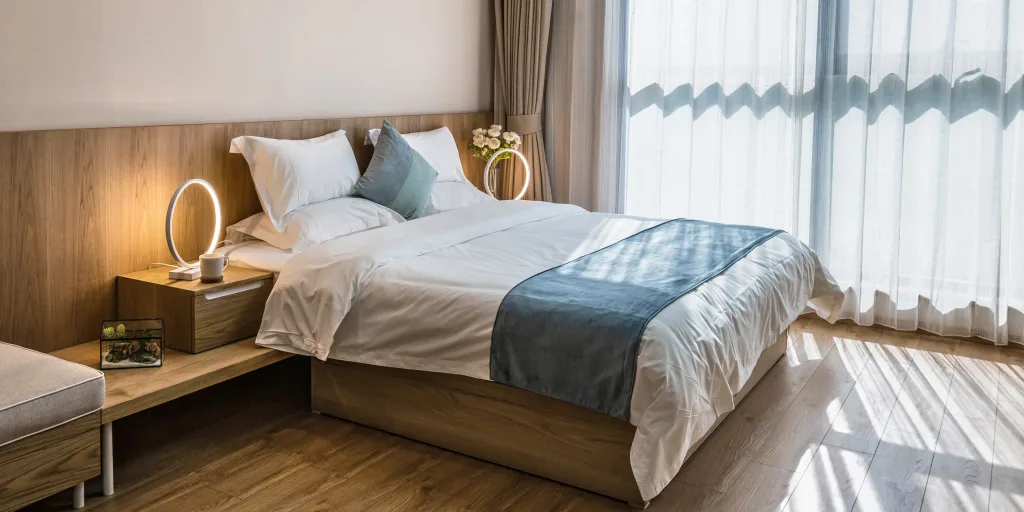
Your Remote Airbnb Business Awaits
Now that you’re equipped with the knowledge and tools needed for how to run a successful Airbnb business remotely, it’s time to embark on your journey.
With dedication, persistence, and the right mindset, you can create a profitable and sustainable business that allows you to enjoy the freedom of remote work while making a lasting impact on the lives of your guests. So, take the leap and embrace the exciting world of remote Airbnb management!
How to Run an Airbnb Business Remotely
If you made it this far and you take action to start your launch an Airbnb, drop your link in the comments. Tell us about what makes your Airbnb a great place to stay.
Favorite all the listings in the comment section to help with search ranking on Airbnb.
As with every new venture you get to a point where you know enough about the subject to be dangerous. Don’t charge forward acting like a real estate expert after your current home operates successfully for a month.
Welcome to the wonderful world of remote Airbnb ownership. Your generational wealth will greatly benefit from this cash flowing real estate portfolio.

![How to Successfully Run an Airbnb Business Remotely [Complete Guide]](https://veronicahanson.com/wp-content/uploads/2023/04/how-to-run-an-airbnb-remotely-728x546.png.webp)

Leave a comment